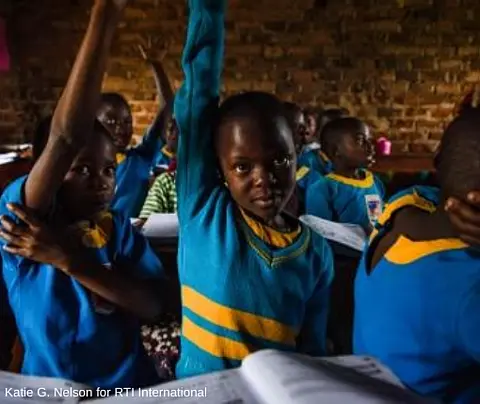RESEARCH TRIANGLE PARK, N.C. — A study led by RTI International, a nonprofit research institute, of a large-scale literacy program in Uganda found that investing in mother tongue reading instruction can achieve significant gains in student literacy outcomes. The study explored results of the United States Agency for International Development (USAID) Uganda School Health and Reading Program (SHRP), an intervention that improved the reading abilities of early grade students in Uganda.
Researchers analyzed 12 randomized controlled trials that show the impact of SHRP on literacy outcomes in different languages and, collectively, demonstrate patterns and provide insights on what is driving the outcomes. The study found that SHRP significantly increased the literacy achievement in nine of the 12 languages overall, and that the complexity of the language of instruction was more predictive of mother tongue learning gains than socioeconomic status or implementation fidelity.
SHRP was a large-scale sector reform program that covered 4,097 schools and 43 districts across Uganda. Working through Uganda’s Ministry of Education and Sports (MoES), SHRP developed classroom materials and provided training and support for teachers. The program supported an approach to teach students in grades Primary 1 to Primary 4 to learn to read in their first language, or “mother tongue,” before transitioning to learn to read in English. The study’s findings are instructive for similar contexts where the goal is to teach children in their mother tongue.
“The success of the SHRP program is an encouraging sign that mother tongue reading interventions can have a substantial impact,” said Tracy Brunette, Senior Monitoring, Evaluation and Learning Advisor at RTI, who led the study and previously led monitoring and evaluation efforts for SHRP. Brunette was joined by co-authors Benjamin Piper, Rachel Jordan, and Simon King, all from RTI, and then-RTI expert Rehemah Nabacwa. “There are few rigorous studies on the impact of mother tongue interventions, especially those examining programs being implemented at scale and through existing systems. We hope our findings will help governments, donors, and implementers more effectively invest in interventions to get better results. It may take more time and resources to see reading gains when working with complex languages, at scale, through existing local systems.”
The study differs from previous research in that it examined not only SHRP’s impact on reading outcomes by language, but also three contextual factors that affected outcomes. Critically, the study found that the complexity of the language of instruction had the largest effect on student learning outcomes, and that SHRP had a smaller impact when instruction was carried out in more complex languages. The researchers also found that socioeconomic indicators such as preschool attendance, students wearing shoes, and average class enrollment predicted impact, but that their effects were less than that of language complexity. The fact that language complexity was more predictive than either socioeconomic status or implementation fidelity was surprising to the authors and is worthwhile for program designers to consider in the future.
The study, “The Impact of Mother Tongue Reading Instruction in Twelve Ugandan Languages and the Role of Language Complexity, Socioeconomic Factors, and Program Implementation” was published in Comparative Education Review.
RTI is the lead implementing partner for SHRP and the Uganda Literacy Achievement and Retention Activity, both of which are funded by USAID and implemented in partnership with Uganda’s MoES. Through these programs and the Uganda Teacher and School Effectiveness Project implemented by the MoES with funding from the Global Partnership for Education, more than 10,000 schools (80 percent of all government-funded schools), 75,000 teachers, and 5 million children across 103 districts have benefited from an approach to early grade reading that emphasizes improving teacher training and support and providing quality, language-appropriate materials to every primary school child in Uganda.

- A study led by RTI International of a large-scale literacy program in Uganda found that investing in mother tongue reading instruction can achieve significant gains in student literacy outcomes.
- The study explored results of the United States Agency for International Development (USAID) Uganda School Health and Reading Program (SHRP), an intervention that improved the reading abilities of early grade students in Uganda.
RTI International Media Relations:
As an independent, scientific research institute with a mission to improve the human condition, RTI International is engaged by clients and partners to conduct evidence-based research and project implementation. We share our work in line with journalistic and scientific standards and maintain a record in RTI’s Newsroom.
RTI International is an independent scientific research institute dedicated to improving the human condition. Our vision is to address the world's most critical problems with technical and science-based solutions in pursuit of a better future. Clients rely on us to answer questions that demand an objective and multidisciplinary approach—one that integrates expertise across social, statistical, data, and laboratory sciences, engineering, and other technical disciplines to solve the world’s most challenging problems.
For more information, visit www.rti.org.
